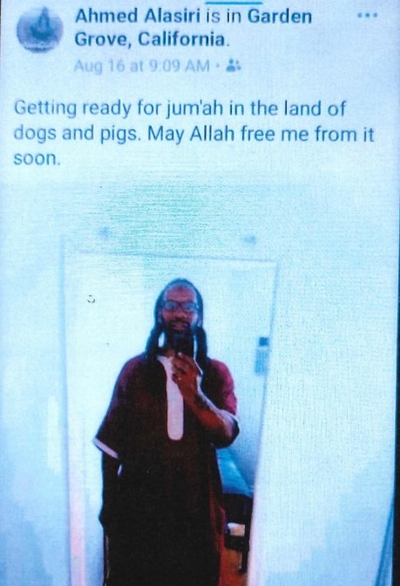 A recently released would-be jihadist who wanted to attack Southern California military targets and synagogues will be subject to warrantless searches of his home and belongings, including computers, cellular phones and other electronics.
A recently released would-be jihadist who wanted to attack Southern California military targets and synagogues will be subject to warrantless searches of his home and belongings, including computers, cellular phones and other electronics.
U.S. District Court Judge Cormac J. Carney on Monday made permanent a series of extra restrictions for Kevin James, who violated limits on cell phone use and outside activities almost immediately after his July release from prison.
While an inmate serving time for armed robbery in California state prison, James created the radical Islamic group Jam'iyyat Ul-Islam Is-Saheeh (JIS). Prosecutors described JIS as "a Muslim extremist group who recruited others to carry out violent attacks ... [against] U.S. military locations and Jewish synagogues." He designed the plot and recruited others "even while his freedoms were restricted in state custody."
James pleaded guilty in 2007 to conspiring to wage war against the United States through terrorism. But at that time, prosecutors and probation officers did not anticipate the need to impose added restrictions once his sentence was over. As we reported last month, the case illustrates a pressing challenge facing the country as more jihadis complete their sentences.
The added restrictions on James' computer use and movements would "have a detrimental effect on his rehabilitation," his attorney argued.
 After more than 20 years in prison, James does not appear to have walked out with moderated views. He posted a picture online in August describing himself as living "in the land of dogs and pigs. May Allah free me from it soon." It would seem from this that James has no desire to be rehabilitated from his radical ideology.
After more than 20 years in prison, James does not appear to have walked out with moderated views. He posted a picture online in August describing himself as living "in the land of dogs and pigs. May Allah free me from it soon." It would seem from this that James has no desire to be rehabilitated from his radical ideology.
Carney's order cited James' own admissions in finding he violated his original release provisions, and imposed the new restrictions over defense objections. James' attorney filed a notice of appeal. She had argued that requiring James to wear a GPS monitor constitutes an "overwhelming intrusion into his rights both to privacy and freedom of movement."
A terrorist demanding a "right to privacy" – we've heard that before. Recently convicted terrorist Salah Abdeslam sued the French government for violating his right to privacy while he was being held in the Fleury-Merogis maximum security prison. His attorney alleged that the use of surveillance cameras monitoring Salah's every movement in the prison was an intrusion on his right to a private life.
Salah, you may recall, was captured after a violent shootout with Belgian counter terrorism police. Salah was being sought for his role in the November 2015 Paris attacks that killed 130 people and injured 350 more. The Versailles Administrative Court ruled in his favor, awarding him a monetary settlement for his pain and suffering.
In the James case, his attorney claimed that restrictions on computer and electronics use, along with the right to be searched at any time, is "Impermissibly Vague" and not relevant. However, we know that the internet is a primary recruitment tool for terrorist organizations like al-Qaida and ISIS.
James' attorney also claimed that the modified restrictions would provide an opportunity for authorities to "spy on Mr. James for the next ... three years." Thankfully, Judge Carney saw through that canard. Gathering information on where a convicted terrorist is, or who he associates with, is a vital tool for law enforcement in protecting society.
That information gathered should also be shared with the law enforcement community.
The argument that the modified conditions would lead James into "social isolation" is utterly ridiculous.
His attorney claimed it would "scare" James into avoiding participation in public life.
That sounds a lot like the claims made by "Underwear Bomber" Umar Farouk Abdulmutallab's attorneys, who argued that security conditions placed on him would "prohibit him from having any communication whatsoever with more than 7.5 billion people, the vast majority of people on the planet." The current special administrative measures (SAM) placed on Abdulmutallab restrict his telephonic communication, his visits and his correspondence.
All three methods of social contact have been used by convicted terrorists to communicate with each other and to orchestrate terror attacks. For instance, while in Attica state prison, El Sayyid Nosair used both the telephone and prison visitor program to plot the first World Trade Center attack in 1993. Co-conspirator Mohammed Salameh used his prison correspondence privilege to communicate with Mohamed Achraf, an Islamic terrorist involved in the 2004 Madrid train bombing.
There are no uniform standards for restrictions on a terrorist released from prison and serving the subsequent probationary period. Every time a terrorist is released, the U.S. Probation Office and the U.S. Attorney's Office have to apply to the court for changes to the supervised release conditions.
At some point, Congress needs to enact specialized, mandatory conditions of supervised release for convicted terrorists similar to what is done for sex or domestic violence offenders. Additionally, local communities and law enforcement should be notified when a terrorist is released.
James did not object to an order that he "not associate with anyone known to him to be a member of Jam'iyyat Ul-Islam Is-Saheeh (JIS) organization and others known to him to be participants in JIS' criminal activities."
It remains to be seen whether James will abide by the conditions of supervised release imposed by Judge Carney. James' conduct so far does not instill confidence.
IPT Senior Fellow Patrick Dunleavy is the former Deputy Inspector General for New York State Department of Corrections and author of The Fertile Soil of Jihad. He currently lectures a class on terrorism for the United States Air Force's Special Operations School.


